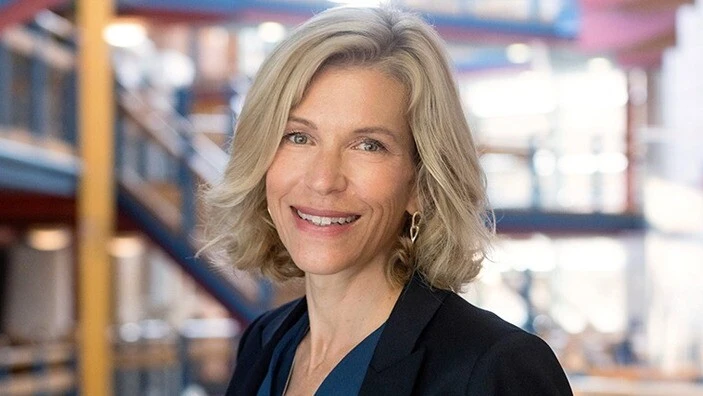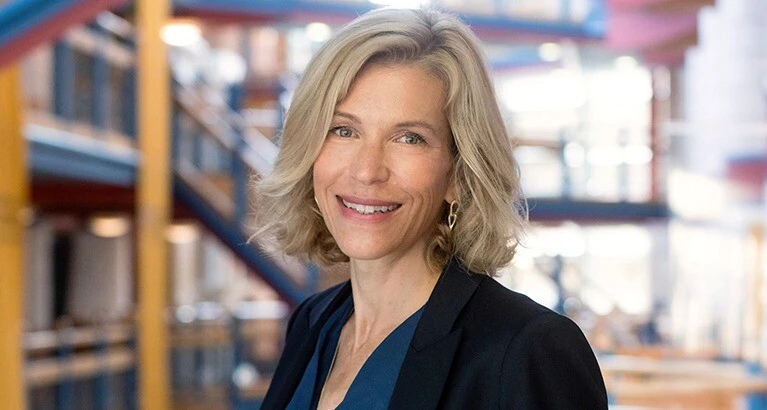Diageo Professor in Organisation Studies
BSc (Queen’s University), MA (University of Oxford), PhD (Massachusetts Institute of Technology)
My research interests include business transformation for sustainability, organisational change, organisational culture, identity and routines, and future of work. I’ve conducted in-depth qualitative studies in a variety of sectors, including manufacturing, apparel, and energy, have published more than 40 academic journal articles and several books, and am active in advisory work.
I’m Head of the Organisational Theory and Information Systems subject group at Cambridge Judge Business School, which is engaged with cross-disciplinary themes including leadership.

My details
Contact details
Academic area
Professional experience
Professor Howard-Grenville’s research is focused on how people and organisations generate and navigate change. She has conducted in-depth qualitative studies in a variety of sectors, including manufacturing, apparel and energy.
Professor Howard-Grenville has published more than 40 academic journal articles, several books, and contributes to publications like Harvard Business Review and the Financial Times. She teaches on change management and sustainability topics at all levels (undergraduate through PhD), including executive education, and is active in advisory work.
She has served as both Deputy Editor and Associate Editor at one of the management field’s flagship academic journals, Academy of Management Journal, and is a Fellow of the Academy of Social Sciences, and a Fellow of Trinity Hall, Cambridge. She received her PhD at MIT, her MA at Oxford, and her BSc (Eng) at Queen’s University, Canada.
Previous appointments
Jennifer Howard-Grenville was previously Associate Professor of Management at the University of Oregon’s Lundquist College of Business.
Publications
Selected publications
- Galdon, C., Haanes, K., Halbheer, D., Howard-Grenville, J., Le Goulven, K., Rosenberg, M., Tufano, P. and Whitelaw, A. (2022) ”Business schools must do more to address the climate crisis.” Harvard Business Review, 1 February 2022
- Howard-Grenville, J., Nelson, A., Vough, H. and Zilber, T.B. (2021) “From the editors: achieving fit and avoiding misfit in qualitative research.” Academy of Management Journal, 64(5): 1313-1323 (DOI: 10.5465/amj.2021.4005)
- Empson, L. and Howard-Grenville, J. (2021) “How has the past year changed you and your organization?” Harvard Business Review, 10 March 2021
- Howard-Grenville, J. (2021) “ESG impact is hard to measure – but it’s not impossible.” Harvard Business Review, 22 January 2021
- Howard-Grenville, J., Lahneman, B. and Pek, S. (2020) “Organizational culture as a tool for change.” Stanford Social Innovation Review, 18(3): 28-33 (DOI: 10.48558/qt3w-na41)
- de Rond, M., Holeman, I. and Howard-Grenville, J. (2019) “Sensemaking from the body: an enactive ethnography of rowing the Amazon.” Academy of Management Journal, 62(6): 1961-1988 (DOI: 10.5465/amj.2017.1417)
For a complete list of Professor Howard-Grenville’s academic journal publications, please see Google Scholar, or her CV (on the right).
Visit her website for the most up-to-date information about her work.
Journal articles
- Lahneman, B., Walls, J.L., Unter, K.M.M. and Howard-Grenville, J. (2026) “Express: (Re)focusing on planetary boundaries for corporate sustainability research.” Strategic Organization (DOI: 10.1177/14761270251315632) (published online Jan 2025)
- Lahneman, B. and Howard-Grenville, J. (2025) “Systems approaches for corporate sustainability: how a certification program can develop and enact a bridging capacity.” Organization and Environment, 38(3): 347-377 (DOI: 10.1177/10860266251325268)
- Gapp, T. and Howard-Grenville, J. (2024) “Bringing organizational cultures together for social impact.” Stanford Social Innovation Review, 25 November 2024 (DOI: 10.48558/6a7b-2g56)
- Noonan, A., Howard-Grenville, J. and Khalifa, D. (2023) “Corporate activism when the stakes are high: how traditional organizations can navigate the space of corporate activism.” California Management Review, 17 April 2023
- Galdon, C., Haanes, K., Halbheer, D., Howard-Grenville, J., Le Goulven, K., Rosenberg, M., Tufano, P. and Whitelaw, A. (2022) ”Business schools must do more to address the climate crisis.” Harvard Business Review, 1 February 2022
- Howard-Grenville, J. and Spengler, J. (2022) “Surfing the grand challenges wave in management scholarship: how did we get here, where are we now, and what’s next?” Research in the Sociology of Organizations, 79: 279-295 (DOI: 10.1108/S0733-558X20220000079025)
- Empson, L. and Howard-Grenville, J. (2021) “How has the past year changed you and your organization?” Harvard Business Review, 10 March 2021
- Hahn, T., Howard-Grenville, J., Lyon, T., Russo, M.V. and Walls, J.L. (2021) “Leadership forum on organizations and sustainability: taking stock, looking forward.” Organization and Environment, 34(1): 3-17 (DOI: 10.1177/1086026621992147)
- Howard-Grenville, J. (2021) “Caring, courage and curiosity: reflections on our roles as scholars in organizing for a sustainable future.” Organization Theory, 2(1) (DOI: 10.1177/2631787721991143)
- Howard-Grenville, J. (2021) “ESG impact is hard to measure – but it’s not impossible.” Harvard Business Review, 22 January 2021
- Howard-Grenville, J. (2021) “Grand challenges, Covid-19 and the future of organizational scholarship.” Journal of Management Studies, 58(1): 252-256 (DOI: 10.1111/joms.12647)
- Howard-Grenville, J. and Lahneman, B. (2021) “Bringing the biophysical to the fore: re-envisioning organizational adaptation in the era of planetary shifts.” Strategic Organization, 19(3): 478-493 (DOI: 10.1177/1476127021989980)
- Howard-Grenville, J., Nelson, A., Vough, H. and Zilber, T.B. (2021) “From the editors: achieving fit and avoiding misfit in qualitative research.” Academy of Management Journal, 64(5): 1313-1323 (DOI: 10.5465/amj.2021.4005)
- Howard-Grenville, J. (2020) “How to sustain your organization’s culture when everyone is remote.” MIT Sloan Management Review, 62(1): 1-4
- Howard-Grenville, J. (2020) “How to sustain your organization’s culture when everyone is remote.”MIT Sloan Management Review, 62(1): 1-4
- Howard-Grenville, J., Lahneman, B. and Pek, S. (2020) “Organizational culture as a tool for change.” Stanford Social Innovation Review, 18(3): 28-33 (DOI: 10.48558/qt3w-na41)
- de Rond, M., Holeman, I. and Howard-Grenville, J. (2019) “Sensemaking from the body: an enactive ethnography of rowing the Amazon.”Academy of Management Journal, 62(6): 1961-1988 (DOI: 10.5465/amj.2017.1417)
- Cornwell, T.B., Howard-Grenville, J. and Hampel, C. (2018) “The company you keep: how an organization’s horizontal partnerships affect employee organizational identification.”Academy of Management Review, 43(4): 772–791 (DOI: 10.5465/amr.2016.0209)
- Howard-Grenville, J., Nelson, A.J., Earle, A.G., Haack, J.A. and Young, D.M. (2017) “‘If chemists don’t do it, who is going to?’ Peer-driven occupational change and the emergence of green chemistry.”Administrative Science Quarterly, 62(3): 524–560 (DOI: 10.1177/0001839217690530)
- Bertels, S., Howard-Grenville, J. and Pek, S. (2016) “Cultural molding, shielding, and shoring at Oilco: the role of culture in the integration of routines.”Organization Science, 27(3): 573-593 (DOI: 10.1287/orsc.2016.1052)
- George, G., Howard-Grenville, J., Joshi, A. and Tihanyi, L. (2016) “Understanding and tackling societal grand challenges through management research.”Academy of Management Journal, 59(6): 1880–1895 (DOI: 10.5465/amj.2016.4007)
- Howard-Grenville, J., Buckle, S.J., Hoskins, B.J. and George, G. (2014) “Climate change and management.”Academy of Management Journal, 57(3): 615-623 (DOI: 10.5465/amj.2014.4003)
- Nelson, A., Earle, A., Howard-Grenville, J., Haack, J. and Young, D. (2014) “Do innovation measures actually measure innovation? Obliteration, symbolic adoption, and other finicky challenges in tracking innovation diffusion.”Research Policy, 43(6): 927-940 (DOI: 10.1016/j.respol.2014.01.010)
- Paquin, R.L., Tilleman, S.G. and Howard-Grenville, J. (2014) “Is there cash in that trash?”Journal of Industrial Ecology, 18(2): 268-279 (DOI: 10.1111/jiec.12120)
- Howard-Grenville, J., Metzger, M.L. and Meyer, A.D. (2013) “Rekindling the flame: processes of identity resurrection.”Academy of Management Journal, 56(1): 113-136 (DOI: 10.5465/amj.2010.0778)
- Paquin, R.L. and Howard-Grenville, J. (2013) “Blind dates and arranged marriages: longitudinal processes of network orchestration.”Organization Studies, 34(11): 1623-1653 (DOI: 10.1177/0170840612470230)
- Aten, K., Howard-Grenville, J. and Ventresca, M.J. (2012) “Organizational culture and institutional theory: a conversation at the border.”Journal of Management Inquiry, 21(1): 78-83 (DOI: 10.1177/1056492611419790)
- Paquin, R.L. and Howard-Grenville, J. (2012) “The evolution of facilitated industrial symbiosis.”Journal of Industrial Ecology, 16(1): 83-93 (DOI: 10.1111/j.1530-9290.2011.00437.x)
- Howard-Grenville, J., Golden-Biddle, K., Irwin, J. and Mao, J. (2011) “Liminality as cultural process for cultural change.”Organization Science, 22(2): 522-539 (DOI: 10.1287/orsc.1100.0554)
- Parmigiani, A. and Howard-Grenville, J. (2011) “Routines revisited: exploring the capabilities and practice perspectives.”The Academy of Management Annals, 5(1): 413-453 (DOI: 10.1080/19416520.2011.589143)
- Gutierrez, B., Howard-Grenville, J. and Scully, M.A. (2010) “The faithful rise up: split identification and an unlikely change effort.”Academy of Management Journal, 53(4): 673-699 (DOI: 10.5465/AMJ.2010.52814362)
- Howard-Grenville, J., Nash, J. and Coglianese, C. (2008) “Constructing the license to operate: internal factors and their influence on corporate environmental decisions.”Law and Policy, 30(1): 73-107 (DOI: 10.1111/j.1467-9930.2008.00270.x)
- Howard-Grenville, J.A. (2007) “Developing issue-selling effectiveness over time: issue selling as resourcing.”Organization Science, 18(4): 560-577 (DOI: 10.1287/orsc.1070.0266)
- Howard-Grenville, J.A. (2006) “Getting influence: how an organizational group gains action on environmental issues over time.”Academy of Management Annual Meeting Proceedings, 2006: C1-C6 (DOI: 10.5465/AMBPP.2006.27177879)
- Howard-Grenville, J.A. (2006) “Inside the “black box”: how organizational culture and subcultures inform interpretations and actions on environmental issues.”Organization and Environment, 19(1): 46-73 (DOI: 10.1177/1086026605285739)
- Howard-Grenville, J.A. and Carlile, P.R. (2006) “The incompatibility of knowledge regimes: consequences of the material world for cross-domain work.”European Journal of Information Systems, 15(5): 473-485 (DOI: 10.1057/palgrave.ejis.3000635)
- Howard-Grenville, J.A. (2005) “Explaining shades of green: why do companies act differently on similar environmental issues?”Law & Social Inquiry, 30(3): 551-581 (DOI: 10.1111/j.1747-4469.2005.tb00353.x)
- Howard-Grenville, J.A. (2005) “The persistence of flexible organizational routines: the role of agency and organizational context.”Organization Science, 16(6): 618-636 (DOI: 10.1287/orsc.1050.0150)
- Howard-Grenville, J.A., Hoffman, A.J. and Wirtenberg, J. (2003) “The importance of cultural framing to the success of social initiatives in business.” Academy of Management Executive, 17(2): 70-86
- Howard, J., Nash, J. and Ehrenfeld, J. (2000) “Standard or smokescreen? Implementation of a voluntary environmental code.” California Management Review, 42(2): 63-82 (DOI: 10.2307/41166033)
- Howard, J., Nash, J. and Ehrenfeld, J. (1999) “Industry codes as agents of change: responsible care adoption by US chemical companies.” Business Strategy and the Environment, 8(5): 281-295
Books, monographs, reports and case studies
- Shuckburgh, E., Zenghelis, D., Agarwala, M., Diaz Anadon, L., Howard-Grenville, J., Penasco, C., Seega, N., Whittington, E., Barford, A., Brayne, C. et al (2020) A blueprint for a green future: multidisciplinary report on a green recovery from COVID-19 by the Cambridge Zero Policy Forum. Cambridge: Cambridge Open Engage.
- Howard-Grenville, J.A., Bertels, S. and Lahneman, B. (2017) Regulatory management and culture (commissioned by Best-in-Class Regulator Initiative/Alberta Energy Regulator). Philadelphia, PA: Penn Program on Regulation, University of Pennsylvania Law School.
- Howard-Grenville, J., Tsoukas, H. and Langly, A. (2016) Organizational routines: how they are created, maintained, and changed. Oxford: Oxford University Press.
- Boons, F. and Howard-Grenville, J.A. (ed.) (2009) The social embeddedness of industrial ecology. Cheltenham: Edward Elgar.
- Howard-Grenville, J.A. (2007) Corporate culture and environmental practice: making change at a high-technology manufacturer. Cheltenham: Edward Elgar.
- Graedel, T.E. and Howard-Grenville, J.A. (2005) Greening the industrial facility: perspectives, approaches, and tools. New York: Springer.
Book chapters
- Howard-Grenville, J. and Gapp, T. (2022) “Organizational culture for sustainability.” In: George, G., Haas, M.R., Joshi, H., McGahan, A.M. and Tracey, P. (eds.) Handbook on the business of sustainability: the organization, implementation, and practice of sustainable growth. Cheltenham: Edward Elgar, pp.138-151
- Howard-Grenville, J. (2020) “Individual agency and collective patterns of action.” In: Tuveson, M., Ralph, D. and Alexander, K. (eds.) Beyond bad apples: risk culture in business. Cambridge: Cambridge University Press, pp.21-41 (DOI: 10.1017/9781316996959.002)
- Claus, L., de Rond, M., Howard-Grenville, J. and Lodge, J. (2019) “When fieldwork hurts: on the lived experience of conducting research in unsettling contexts.” In: Zilber, T.B., Amis, J.M., Mair, J. (eds.) Research in the sociology of organizations: vol.59: the production of managerial knowledge and organizational theory: new approaches to writing, producing and consuming theory. Bingley: Emerald Group Publishing, pp.157-172
- Howard-Grenville, J. and Rerup, C. (2016) “A process perspective on organizational routines.” In: Langley, A. and Tsoukas, H. (eds.) The SAGE handbook of process organization studies. London: Sage, pp.323-339
- Howard-Grenville, J.A., Bertels, S. and Lahneman, B. (2014) “Sustainability: how it shapes and is shaped by organizational culture and climate.” In Schneider, B. and Barbera, K.N. (eds.) The Oxford handbook of organizational climate and culture. Oxford: Oxford University Press, pp.257-276
- Howard-Grenville, J.A. (2012) “Revealing themes: applying a positive lens to the chapters on environment and sustainability.” In Golden-Biddle, K. and Dutton, J. (eds.) Using a positive lens to explore social change and organizations: building a theoretical and research foundation. London: Routledge.
- Howard-Grenville, J.A. and Bertels, S. (2012) “Organizational culture and environmental action.” In Bansal, T. and Hoffman, A.J. (eds.) The Oxford handbook of business and the environment. Oxford: Oxford University Press, pp.194-210
- Howard-Grenville, J.A. and Paquin, R. (2008) “Organizational dynamics in industrial ecosystems: insights from organizational behavior theory.” In Ruth, M. and Davidsdottir, B. (eds.) Changing stocks, flows and behaviors in industrial ecosystems. Cheltenham: Edward Elgar, pp.122-139
- Paquin, R. and Howard-Grenville, J. (2008) “Facilitating regional industrial symbiosis: network growth in the UK’s National Industrial Symbiosis Programme.” In: Boons, F. and Howard-Grenville, J. (eds.) The social embeddedness of industrial ecology. Cheltenham: Edward Elgar, pp.103-127
- Howard-Grenville, J.A., Hoffman, A.J. and Bhattacharya, C.B. (2007) “Who can act on sustainability issues? Corporate capital and the configuration of organizational fields.” In Sharma, S., Starik, M. and Husted, B. (eds.) Organizations and the sustainability mosaic: crafting long-term ecological and societal solutions. Cheltenham: Edward Elgar, pp.193-215
- Howard-Grenville, J.A. (2002) “Institutional evolution: the case of the semiconductor industry voluntary PFC emissions reduction agreements.” In Hoffman, A. and Ventresca, M. (eds.) Organizations, policy, and the natural environment. Stanford, CA: Stanford University Press, pp.291-308
- Howard-Grenville, J.A. (1998) “Implementation of global environmental treaties: the role for coordinated corporate action.” In Moomaw, W., Susskind, L. and Hill, T. (eds.) Papers on international environmental negotiation: vol.VI. Cambridge, MA: Harvard Law School
- Ehrenfeld, J. and Howard-Grenville, J. (1996) “Setting environmental goals: the view from industry: a review of practices from the 1960s to the present.” In: National Forum on Science and Technology Goals (eds.) Linking science and technology to society’s environmental goals. Washington, DC: National Academies Press, pp.281-326
Awards and honours
- Elected Fellow of the Academy of Social Sciences, 2021
- Best Paper Published in 2019 Award (for “Sensemaking from the body: an enactive ethnography of rowing the Amazon” with Mark de Rond and Isaac Holeman), Academy of Management (OMT Division), 2020
- Best Paper Award (for “Role regeneration as a pathway to ‘powerless’ category persistence” with Matthew Lee Metzger), Academy of Management (OMT Division), 2018
- IACMR Presidential Award for Responsible Research in Management, 2017
- Best Paper Award, Sustainability, Ethics and Entrepreneurship (SEE) Conference, 2015
- Faculty Excellence Award (14 across the University), University of Oregon, 2013
- Thomas C Stewart Distinguished Professor, Lundquist College of Business, 2013
- James E Reinmuth MBA Teaching Excellence Award, 2012
- James E Reinmuth MBA Teaching Excellence Award, 2010
- Faculty Pioneer Award Finalist, Aspen Institute, 2008
News and insights
Professor Jennifer Howard-Grenville, whose research focuses on business sustainability and how organisations and individuals navigate change, is named one of 92 new Fellows of the British Academy.
TRANSFORM, an impact accelerator which has helped 18 million people in Africa and Asia, shows how organisations can avoid culture clash and deliver high-impact social projects, says research by Dr Tirza Gapp and Professor Jennifer Howard-Grenville.
Business school students should quiz prospective employers on how their policies advance sustainability goals, Professor Jennifer Howard-Grenville of Cambridge Judge writes in the Financial Times.
Media coverage
Financial Times | 16 January 2023
Academic research award – tipping point for action
Jennifer Howard-Grenville, Diageo Professor in Organisation studies at Cambridge Judge Business School, speaks about Responsible Business Education award-winning paper.
“It was one of most exciting and impactful research papers I handled in six years at the Academy of Management Journal,” Jennifer said.
FT Specialist’s Agenda by the Financial Times | 27 March 2022
The future of hybrid working – directors must focus on culture
Jennifer Howard-Grenville, Diageo professor of organisation studies at Cambridge Judge Business School, comments on the future of hybrid working.
It is important for boards to remember that the world is still emerging from a transformational period, she says. Companies should be slow and mindful of the diverse experiences of their staff during the pandemic.
“Culture is about how a collective of individuals works towards common goals, despite having diverse experiences and expertise,” Jennifer says.
Poets & Quants | 21 March 2022
B-schools – leading or struggling on gender & race diversity?
New research from Cambridge Judge Business School looks at gender and racial diversity at 22 top US and UK business schools and finds that while B-schools are “strategically positioned to bring lasting change to the global corporate environment,” they still face considerable hurdles in trying to increase diversity.
“Top-ranking UK and US business schools have considerable international diversity, but this cannot be used as proxy for racial diversity,” reads the new report co-authored for the Cambridge Wo+Men’s Leadership Centre by Dr Bola Grace, an executive MBA graduate of Cambridge Judge, and Judge School faculty members Lionel Paolella and Jennifer Howard-Grenville.
Harvard Business Review, 1 February 2022
Business schools must do more to address the climate crisis
IEDP, 18 November 2021
The environment and business post COP26
Mirage News, 1 October 2021
Academy of Social Sciences confers Fellowships on three Cambridge academics
Fast Company, 1 June 2021
Don’t make these four mistakes when managing newly remote teams
Marketplace, 14 April 2021
Can company culture survive Zoom?
Harvard Business Review, 10 March 2021
How has the past year changed you and your organisation?
Financial Times, 8 March 2021
Women in meetings should be heard as well as seen
HR Daily Advisor, 3 March 2021
How finding the right culture match has changed in our remote world
The New York Times, 24 January 2021
How to keep internet trolls out of remote workplaces
Harvard Business Review, 22 January 2021
ESG impact is hard to measure – but it’s not impossible
MIT Sloan Management Review, 28 December 2020
Nine leadership lessons 2020 gave us
Financial Times, 22 November 2020
Pandemic boost to tech and digital industries worsens gender job divide
Medium, 17 September 2020
How to preserve culture during remote work?
MIT Sloan Management Review, 2 September 2020
Three ways managers can preserve culture during remote work
Personall & ledarska, 25 August 2020
This is how the organisational culture is kept alive during the pandemic
Associations Now, 12 July 2020
Preserving your organisational culture from a distance
MIT Sloan Management Review, 24 June 2020
How to sustain your organisation’s culture when everyone is remote
Cambridge Business Magazine, 1 April 2017
How to avoid culture clashes when bringing in new routines
CBC Radio, 28 July 2014
What a waste – industrial waste




